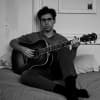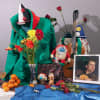Parquet Courts can sound so loud and uncouth onstage that it’s easy to overlook all the delicate little paradoxes built into their tightly wound, economical post-punk. Like the fact, for instance, that they’re just as likely to sing about gripping a pack of Swedish Fish at a late-night bodega as they are to turn a line like Socrates died in the fuckin’ gutter. For all its understatement and restraint, likewise, their compositional style can be tricky and off-kilter enough to require a significant amount of skill to play correctly—especially at the speed they seem to want to play their songs, which seems to be getting faster and faster. When I met up with Texas natives Andrew Savage and Austin Brown—the four-piece's two vocalists—one afternoon last week in Brooklyn, they explained the genesis of for their very earwormy, self-released Light Up Gold debut, which was recently reissued by What's Your Rupture?. Hearing it again, the album feels simultaneously as rough and as refined as the city they now call home.
You requested prior to this interview that I not ask you about being a “Texas band.” Is that because too many people have asked you about that? SAVAGE: Everybody kind of wants to talk about that, and I don’t have a problem talking about it, but I am just kind of curious: why does it matter? A lot of people say, “This is a Brooklyn-via-Texas band,” and it’s like, really any bands from New York are from New York, so why do we get a geographic locale? And I guess I haven’t really heard an answer yet, to does it really matter and why is it of concern. A big point of misinformation has been that the band started in Texas and then moved to New York. We all started the band in New York after we moved here. It’s a small distinction, but it’s correct, and I feel like if you’re gonna be a journalist you should put the truth, you know? It almost is like, “Oh, going to the big city to make it big.” BROWN: It’s exactly that, which couldn’t be further from what actually happened. SAVAGE: When I moved to New York there was no Parquet Courts. It wasn’t even an idea yet, really. BROWN: Even Parquet Courts, for its first year or something, I have a hard time even remembering what it sounded like. It’s the same idea we had now, but it was different and weird. The sound of our band wasn’t really defined yet. Even at live shows, maybe we would have five songs, but some of them would be ten minutes of us just jamming or just riffing. SAVAGE: It was sloppier, for sure. BROWN: We wrote a lot of songs live on stage, just by playing them—like it was a practice, almost. We were really into that. We still are. But we also have our set, our songs. I feel like a lot of Light Up Gold was written just in the three days we were in the studio. It’s weird to think about where this band started, how it existed in the first year, year-and-a-half, and what it is now is almost different. It’s weird to think that people are making this assumption that we moved here to record Light Up Gold and do press for it.
It’s kind of an easier journalistic narrative. BROWN: It’s easy to imagine that, but it’s not how it was. We played plenty of rooms for no people and opened up shows—like the first of five bands at Silent Barn. Even after Light Up Gold was done, we were playing first of four at Death By Audio.
Did you guys follow the strategy of playing out nonstop until people started to take notice?
SAVAGE: It was so un-strategic. I put out Light Up Gold on my label that I do with my roommate [Dull Tools]; it came out in August. We had a release show for it, but we also played a show, like a week before. And then right after that I went on tour for a month. I wouldn’t say there was any real strategy in it. There was almost no press for the record for the first five months of its life.
On the other side of the Texas thing, you said you don’t want to be asked about being a New York band either? SAVAGE: It’s just kind of a corny question that we’ve been asked a few times. Like, what does it mean to be a New York band? Your guess is as good as mine, but you’re the one who writes about music. I don’t necessarily bear that cross, either, [that] we’re a New York band. We could do it anywhere. I feel like first and foremost we’re probably an American band. But we definitely are from the city. I think that there is a romanticized version of New York, and there is a New York that exists in a lot of people’s minds—especially when the think of rock music and punk music in New York. I don’t feel the need to indulge that kind of romanticism at all. I think that New York is a different place now then it was during the days of all those bands that we’re into. Really it’s more kind of about being an artist who’s living in the moment, and right now we’re here.
And yet some of the things you talk about in the songs—like going to a bodega in Ridgewood, Queens, late at night, or complaining about the DMV being too far of a walk—really speak to my experience specifically as a New Yorker. SAVAGE: That’s good. That's the whole point of what we’re doing—to create a relationship with the listener. The whole idea of being immediate and being an artist that’s living in the present is that you kind of have to write about what you know, and those are all things that we know.
And if you go on the road, you write about the things that you’re experiencing out there. SAVAGE: Sure, just being from America is a big part of it. I’m really interested as an artist in the duality of things being really ugly and being really pretty and I think there’s a lot of ugliness in this country and a lot of really pretty, admirable things. In my writing at least, what I would like to unveil [is that] there’s a thin line between those two ideas—especially in New York, because New York can be a very urban-ly scenic, picturesque city, and a lot of people move here for these industries like fashion or movies or being a photographer or something. It kind of keeps you captive in this ornamental reality. There is definitely that kind of “high-class” part of New York—the art scene and everything. But then there’s also a lot of ugliness to it. I like that part of New York and America. I live in Bed-Stuy, where there’s beautiful homes, but there’s also kind of this blight that surrounds it. It’s kind of a definitively New York area. The same thing [is true] in the broader sense with the United States: what the United States means to the world and what its reputation is, is this kind of global trendsetter maybe, and even exporter of coolness. It’s definitely filled with its own problems that are kind of really sad. There’s a bittersweet part of American life that I like to talk about in music. BROWN: A lot of our inspiration comes from living in New York and being confronted with that the minute you step out the door. New York can be emotionally isolating, but personally and physically you’re constantly surrounded by people and culture. For better or for worse, it’s in your face. And it’s great. Especially as a writer.
You guys have been here for a while. What existences have you lived here in New York outside of music? SAVAGE: I came here with the idea that I was gonna do music in some capacity. I’ve worked a handful of jobs, the most recent of which I did for about a year and a half. I did a lot of things, but basically shipping and receiving coordinator at a warehouse. Still, I’ve always made it a point to have a disciplined creative regimen. I go for walks; I wake up early. I feel perfectly okay not working a luxury industry job; I have no desire to work in the music industry or work in the art world or anything. I’d much rather work as a shipping and receiving coordinator. BROWN: It’s hard to speak of life outside of [being a] musician, because I feel that’s the one way I defined myself for, like, ever. I’ve made it a point to stay out of the art world when I’m looking for jobs and getting jobs because that was never what I wanted to do. I never wanted my creative passions to be satisfied by something that wasn’t what I wanted to be doing, which was creating. I worked some really painful jobs, never got paid enough. I was a bellman at a hotel for like a year, when I got fired. I’ve gotten fired from a lot of jobs. I’ve quit a lot of jobs, almost all of them in the service industry. I’ve been a porter, which is probably the most menial of all of the jobs. I worked at a bar on Bedford and North 6th and I would come in at five in the morning and sweep and mop the floors and clean the toilets. I loved it, actually. It was probably one of my favorite jobs. I would just come in there and play whatever music I wanted to. The toilets part bothered me because it felt like this weird punishment; it motivated me because I was like, Okay, this is not a sustainable thing. I have to do something better for myself, but this is all I can do right now because I have zero job qualifications. I’d almost always come home pissed off and waiting for the next thing, like what am I gonna do now. There’s strange inspiration that comes from that.
I was interested in the meaning of the Light Up Gold idea that you named the album after. In the song of the same name, you sing that light up gold was the color of something I was looking for. SAVAGE: That’s something that has to be really open to interpretation, or else it loses its magic, because it means something to me but it might not mean the same thing to someone who’s listening to the songs. A lot of the record is about looking for stuff, whether it’s like looking for a snack [when] you’re walking around at night, or whether you’re looking for inspiration—like in “Borrowed Time,” a song about writer’s block. A lot of the music is about the passing of time and having to be patient and knowing that there’s something that you need or that you’re looking for and that it needs to be found. That whole mindset was a lot where I was when I wrote the lyrics to my songs. It wasn’t until later that I noticed it was kind of a common theme. I do think that “Light Up Gold” is kind of the keystone for the record, in that it feels kind of like the nucleus that all the other songs kind of revolve around. I think that all the other songs are kind of juxtaposed to it.
When I first heard the record, I thought immediately of Pavement, and how Steve Malkmus’ songs also revolve around storytelling, but with a kind of deliberate obtuseness. Where do you position yourself in relation to that kind of lyrical ambiguity? BROWN: Have you listened to songs that literally describe what the song is about, in literal terms? Sure you have: they’re bad songs. SAVAGE: It’s important to be somewhat obtuse. I think that you can be emotionally forward and honest without having this rigidly defined narrative in your songs. I think there’s a lot of braver moments on the record where we kind of expose ourselves, but also kind of still leave a little bit to be desired. As a writer, you kind of have to approach it like that, like how am I gonna balance out what part of me I want to expose and what parts I want to keep secret? Because some things need to be kept a secret.


